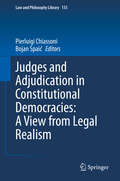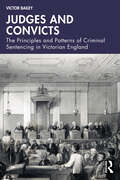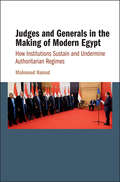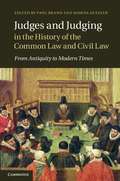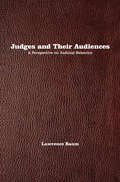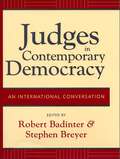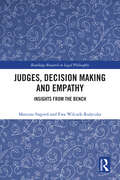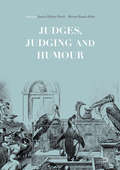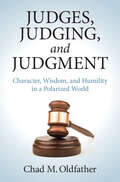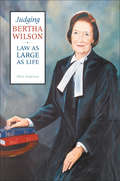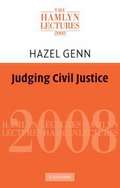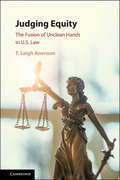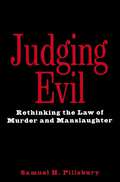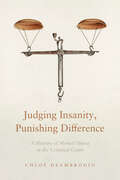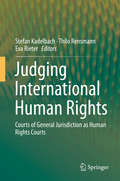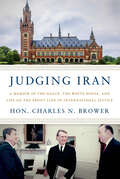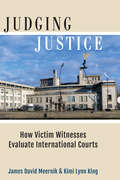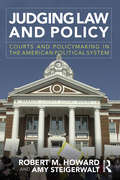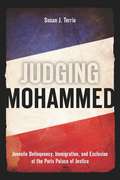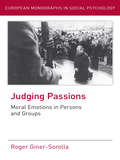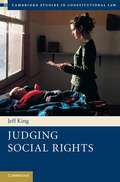- Table View
- List View
Judges and Adjudication in Constitutional Democracies: A View from Legal Realism (Law and Philosophy Library #135)
by Pierluigi Chiassoni Bojan SpaićThe book offers contributions to a philosophical and realistic approach to the place of adjudication in contemporary constitutional democracies. Bringing together scholars from different legal and philosophical backgrounds, the book purports to cast light on the role(s) of judges and the function of judicial interpretation inside of constitutional states, from the standpoint of legal realism as a revisited and sophisticated jurisprudential outlook. In so doing, the book also copes with a few major jurisprudential issues, like, e.g., determining the ideas that make up the core of legal realism, exploring the relation between legal realism and legal positivism, identifying the boundaries of judicial interpretation as they appear from a realist standpoint, as well as considering some skeptical outlooks on the very claims of contemporary legal realism.
Judges and Convicts: The Principles and Patterns of Criminal Sentencing in Victorian England
by Victor BaileyUncovering the origins of the new sentencing structure that emerged in the course of the nineteenth century, this book travels from the demise of the "Bloody Code" in the 1830s, through the mid-century transition from convict transportation to home-based penal servitude, and on to the remarkable and unprecedented mitigation of sentencing severity in the final two decades of the century.By providing such an extended span of analysis, this book reveals the discrete stages of development in sentencing policy and practice, and particularly the contribution of the small coterie of professional judges at the county Assizes, the Old Bailey (or Central Criminal Court), and the Middlesex Sessions, around whose sentencing decisions the study revolves. In consequence, readers are offered an overarching survey of the nineteenth-century trends in sentencing, including an account of the struggle between politicians, mandarins, and judges for supremacy in sentencing, along with a detailed explanation of that remarkable mitigation of sentencing severity that ultimately defined a new equation between crime and punishment, or the modern sentencing tariff.Judges and Convicts: The Principles and Patterns of Criminal Sentencing in Victorian England will be of great appeal to students and scholars of history, law, criminology, and sociology, particularly to those with an interest in the history of the criminal trial, the judiciary, punishment, and sentencing.
Judges and Generals in the Making of Modern Egypt: How Institutions Sustain and Undermine Authoritarian Regimes
by Mahmoud HamadWhy do authoritarian regimes survive? How do dictators fail? What role do political institutions play in these two processes? Many of the answers to these questions can be traced to the same source: the interaction between institutions and preferences. Using Egypt as a case study, Professor Mahmoud Hamad describes how the synergy between judges and generals created the environment for the present government and a delicate balance for its survival. The history of modern Egypt is one of the struggle between authoritarian governments, and forces that advocate for more democratic rights. While the military has provided dictatorial leaders, the judiciary provides judges who have the power to either support or stymie authoritarian power. Judges and Generals in the Making of Modern Egypt provides a historically grounded explanation for the rise and demise of authoritarianism, and is one of the first studies of Egypt's judicial institutions within a single analytical framework.
Judges and Judging in the History of the Common Law and Civil Law
by Paul Brand Joshua GetzlerIn this collection of essays, leading legal historians address significant topics in the history of judges and judging, with comparisons not only between British, American and Commonwealth experience, but also with the judiciary in civil law countries. It is not the law itself, but the process of law-making in courts, that is the focus of inquiry. Contributors describe and analyse aspects of judicial activity, in the widest possible legal and social contexts, across two millennia. The essays cover English common law, continental customary law and ius commune, and aspects of the common law system in the British Empire. The volume is innovative in its approach to legal history. None of the essays offer straight doctrinal exegesis; none take refuge in old-fashioned judicial biography. The volume is a selection of the best papers from the 18th British Legal History Conference.
Judges and Their Audiences: A Perspective on Judicial Behavior
by Lawrence BaumWhat motivates judges as decision makers? Political scientist Lawrence Baum offers a new perspective on this crucial question, a perspective based on judges' interest in the approval of audiences important to them. The conventional scholarly wisdom holds that judges on higher courts seek only to make good law, good policy, or both. In these theories, judges are influenced by other people only in limited ways, in consequence of their legal and policy goals. In contrast, Baum argues that the influence of judges' audiences is pervasive. This influence derives from judges' interest in popularity and respect, a motivation central to most people. Judges care about the regard of audiences because they like that regard in itself, not just as a means to other ends. Judges and Their Audiences uses research in social psychology to make the case that audiences shape judges' choices in substantial ways. Drawing on a broad range of scholarship on judicial decision-making and an array of empirical evidence, the book then analyzes the potential and actual impact of several audiences, including the public, other branches of government, court colleagues, the legal profession, and judges' social peers. Engagingly written, this book provides a deeper understanding of key issues concerning judicial behavior on which scholars disagree, identifies aspects of judicial behavior that diverge from the assumptions of existing models, and shows how those models can be strengthened.
Judges in Contemporary Democracy: An International Conversation
by Stephen Breyer Robert BadinterLaw, politics, and society in the modern West have been marked by the increasing power of the judge: the development of constitutional justice, the evolution of international judiciaries, and judicial systems that extend even further into social life. Judges make decisions that not only enforce the law, but also codify the values of our times.In the summer of 2000, an esteemed group of judges and legal scholars met in Provence, France, to consider the role of the judge in modern society. They included Robert Badinter, former president of the Constitutional Council in France; Stephen Breyer, Justice of the Supreme Court of the United States; Antonio Cassese, the first president of the International Criminal Tribunal for the former Yugoslavia; Dieter Grimm, former vice president of the Constitutional Court of Germany; Gil Carlos Rodriguez, president of the Court of Justice of the European Union; and Ronald Dworkin, formerly of Oxford University, now professor of philosophy and law at the New York University Law School. What followed was an animated discussion ranging from the influence of the media on the judiciary to the development of an international criminal law to the judge's consideration of the judge's own role. Judges in Contemporary Democracy offers a rare and intimate glimpse into the powers and the role of judges in today's society.
Judges on Trial: The Independence and Accountability of the English Judiciary
by Shimon Shetreet Sophie TurenneThe second edition of Judges on Trial articulates the rules, assumptions and practices which shape the culture of independence of the English judiciary today. Enhanced by interviews with English judges, legal scholars and professionals, it also outlines the factors that shape the modern meaning of judicial independence. The book discusses the contemporary issues of judicial governance, judicial appointments, the standards of conduct on and off the bench, the discipline and liability of judges and the relationship between judges and the media. It is accessible to an international audience of lawyers, political scientists and judges beyond the national realm.
Judges, Decision Making and Empathy: Insights from the Bench (Routledge Research in Legal Philosophy)
by Mateusz Stępień Ewa Wilczek-RużyczkaThis book presents empirical research uncovering the views and experiences of Polish judges regarding the utilization of empathy in their work. Although there is growing interest in the role of empathy in judicial decision-making, there is little research on how judges themselves approach this issue. This volume offers an alternative to the usual focus on common law jurisdictions. It adopts a perspective that underscores the impact of professional pressures on judges’ empathic abilities, leading to a form of "empathy labor" influenced by the unique characteristics of the judicial profession. It offers an in-depth examination of judges’ opinions, collected through an empirical study involving in-depth interviews. The narrative delves into real cases and judicial behaviors discussed by judges, providing reference to relevant literature from other jurisdictions. The core finding of the study reveals that while judges may differ in their approaches to empathy in a judicial context, many of their practices and strategies can be linked to empathy-like phenomena. The findings also substantiate the claim that empathy used by judges is not the same as judicial empathy, which covers empathic abilities integrated into performing the judicial role. This applied theoretical perspective of "empathy labor" offers an intriguing view of how the occupational context influences judges’ empathic inclinations throughout their careers. In addition to demonstrating how judges understand the role of empathy in their work, the book outlines a scenario for empathy training based on their experiences and expectations. Presenting an original approach to studying the role of empathy in judicial decision making, the book will be of interest to academics and researchers working in the areas of philosophy of law, legal theory, sociology of law, psychology of law, and emotions studies.
Judges, Judging and Humour
by Jessica Milner Davis Sharyn Roach AnleuThis book examines social aspects of humour relating to the judiciary, judicial behaviour, and judicial work across different cultures and eras, identifying how traditionally recorded wit and humorous portrayals of judges reflect social attitudes to the judiciary over time. It contributes to cultural studies and social science/socio-legal studies of both humour and the role of emotions in the judiciary and in judging. It explores the surprisingly varied intersections between humour and the judiciary in several legal systems: judges as the target of humour; legal decisions regulating humour; the use of humour to manage aspects of judicial work and courtroom procedure; and judicial/legal figures and customs featuring in comic and satiric entertainment through the ages.Delving into the multi-layered connections between the seriousness of the work of the judiciary on the one hand, and the lightness of humour on the other hand, this fascinating collection will be of particular interest to scholars of the legal system, the criminal justice system, humour studies, and cultural studies.
Judges, Judging, and Judgment: Character, Wisdom, and Humility in a Polarized World
by Chad M. OldfatherIn Judges, Judging, and Judgment, Chad M. Oldfather offers an accessible, interdisciplinary account of the constraints and pressures on judges in our polarized world. Drawing on law, political science, psychology, and philosophy, Oldfather examines how these constraints have changed over time and the interpretive methodologies that have gained traction in response. The book emphasizes the inescapable need for judges to exercise judgment and highlights the value of selecting judges who possess good judgment and character. The book builds on prior work that emphasizes the importance of judicial character, specifically practical wisdom, and intellectual humility. The work underscores the need to foster a legal culture that values and rewards judges of character. Judges, Judging, and Judgment is a valuable resource for academics, students, lawyers, judges, and anyone else interested in the legal system's inner workings.
Judges, Law and War: The Judicial Development of International Humanitarian Law
by Shane DarcyInternational courts and judicial bodies play a formative role in the development of international humanitarian law. Judges, Law and War examines how judicial bodies have influenced the substantive rules and principles of the law of armed conflict, and studies the creation, application and enforcement of this corpus of laws. Specifically, it considers how international courts have authoritatively addressed the meaning and scope of particular rules, the application of humanitarian law treaties and the customary status of specific norms. Key concepts include armed conflicts and protected persons, guiding principles, fundamental guarantees, means and methods of warfare, enforcement and war crimes. Consideration is also given to the contemporary place of judicial bodies in the international law-making process, the challenges presented by judicial creativity and the role of customary international law in the development of humanitarian law.
Judging Addicts: Drug Courts and Coercion in the Justice System (Alternative Criminology #6)
by Rebecca TigerThe number of people incarcerated in the U.S. now exceeds 2.3 million, due in part to the increasing criminalization of drug use: over 25% of people incarcerated in jails and prisons are there for drug offenses. Judging Addicts examines this increased criminalization of drugs and the medicalization of addiction in the U.S. by focusing on drug courts, where defendants are sent to drug treatment instead of prison. Rebecca Tiger explores how advocates of these courts make their case for what they call “enlightened coercion,” detailing how they use medical theories of addiction to justify increased criminal justice oversight of defendants who, through this process, are defined as both “sick” and “bad.” Tiger shows how these courts fuse punitive and therapeutic approaches to drug use in the name of a “progressive” and “enlightened” approach to addiction. She critiques the medicalization of drug users, showing how the disease designation can complement, rather than contradict, punitive approaches, demonstrating that these courts are neither unprecedented nor unique, and that they contain great potential to expand punitive control over drug users. Tiger argues that the medicalization of addiction has done little to stem the punishment of drug users because of a key conceptual overlap in the medical and punitive approaches—that habitual drug use is a problem that needs to be fixed through sobriety. Judging Addicts presses policymakers to implement humane responses to persistent substance use that remove its control entirely from the criminal justice system and ultimately explores the nature of crime and punishment in the U.S. today.
Judging Bertha Wilson
by Ellen AndersonMadame Justice Bertha Wilson, the first woman appointed to the Supreme Court of Canada, is an enormously influential and controversial figure in Canadian legal and political history. This engaging, authorized, intellectual biography draws on interviews conducted under the auspices of the Osgoode Society for Legal History, held in Scotland and Canada with Madame Justice Wilson, as well as with her friends, relatives, and colleagues. The biography traces Wilson's story from her birth in Scotland in 1923 to the present. Wilson's contributions to the areas of human rights law and equality jurisprudence are many and well-known. Lesser known are her early days in Scotland and her work as a minister's wife or her post-judicial work on gender equality for the Canadian Bar Association and her contributions to the Royal Commission on Aboriginal Peoples.Through a scrupulous survey of Wilson's judgements, memos, and academic writings (many as yet unpublished), Ellen Anderson shows how Wilson's life and the law were seamlessly integrated in her persistent commitment to a stance of principled contextuality. This stance has had an enduring effect on the evolution of Canadian law and cultural history. Supported with the warmth and generosity of Wilson's numerous personal anecdotes, this work illuminates the life and throught of a woman who has left an extraordinary mark on Canada's legal landscape.
Judging Civil Justice
by Hazel GennThe civil justice system supports social order and economic activity, but a number of factors over the last decade have created a situation in which the value of civil justice is being undermined and the civil courts are in a state of dilapidation. For the 2008 Hamlyn Lectures, Dame Hazel Genn discusses reforms to civil justice in England and around the world over the last decade in the context of escalating expenditure on criminal justice and vanishing civil trials. In critically assessing the claims and practice of mediation for civil disputes, she questions whether diverting cases out of the public courts and into private dispute resolution promotes access to justice, looks critically at the changed expectations of the judiciary in civil justice and points to the need for a better understanding of how judges 'do justice'.
Judging Equity: The Fusion of Unclean Hands in U.S. Law
by T. Leigh AnensonT. Leigh Anenson analyzes the scope of judicial authority and discretion to recognize the equitable doctrine of unclean hands as a bar to actions seeking damages in the United States. Bringing an American perspective to contentious conversation about law-equity fusion in other countries of the common law, Anenson provides a historical, doctrinal, and theoretical account of the integration, analyzes cases in the federal courts and across the fifty states, and places the issue of integration within a broader debate over the fusion of law and equity. Her analysis also includes descriptive and normative accounts of the equitable maxim of unclean hands. This groundbreaking work, which clarifies conflicting case law and advances the idea of a principled fusion of law and equity, should be read by anyone interested in the need for equity - its cultivation, preservation, and celebration.
Judging Evil: Rethinking the Law of Murder and Manslaughter
by Samuel H. PillsburyWhy do killers deserve punishment? How should the law decide? These are the questions Samuel H. Pillsbury seeks to answer in this important new book on the theory and practice of criminal responsibility. In an argument both traditional and fresh, Pillsbury holds that persons deserve punishment according to the evil they choose to do, regardless of their psychological capacities. Using real case examples, he offers concrete proposals for legal reform, urging that modern preoccupations with subjective aspects of wrongdoing be replaced with rules that focus more on the individual's motives.
Judging Faith, Punishing Sin
by Parker Charles H. Starr-Lebeau GretchenJudging Faith, Punishing Sin breaks new ground by offering the first comparative treatment of Catholic inquisitions and Calvinist consistories, offering scholars a new framework for analysing religious reform and social discipline in the great Christian age of reformation. Global in scope, both institutions played critical roles in prosecuting deviance, implementing religious uniformity, and promoting moral discipline in the social upheaval of the Reformation. Rooted in local archives and addressing specific themes, the essays survey the state of scholarship and chart directions for future inquiry and, taken as a whole, demonstrate the unique convergence of penitential practice, legal innovation, church authority, and state power, and how these forces transformed Christianity. Bringing together leading scholars across four continents, this volume is an invaluable contribution to our understanding of religion in the early modern world. University students and scholars alike will appreciate its clear introduction to scholarly debates and cutting edge scholarship.
Judging Insanity, Punishing Difference: A History of Mental Illness in the Criminal Court (The Cultural Lives of Law)
by Chloé DeambrogioIn Judging Insanity, Punishing Difference, Chloé Deambrogio explores how developments in the field of forensic psychiatry shaped American courts' assessments of defendants' mental health and criminal responsibility over the course of the twentieth century. During this period, new psychiatric notions of the mind and its readability, legal doctrines of insanity and diminished culpability, and cultural stereotypes about race and gender shaped the ways in which legal professionals, mental health experts, and lay witnesses approached mental disability evidence, especially in cases carrying the death penalty. Using Texas as a case study, Deambrogio examines how these medical, legal, and cultural trends shaped psycho-legal debates in state criminal courts, while shedding light on the ways in which experts and lay actors' interpretations of "pathological" mental states influenced trial verdicts in capital cases. She shows that despite mounting pressures from advocates of the "rehabilitative penology," Texas courts maintained a punitive approach towards defendants allegedly affected by severe mental disabilities, while allowing for moralized views about personalities, habits, and lifestyle to influence psycho-legal assessments, in potentially prejudicial ways.
Judging International Human Rights: Courts Of General Jurisdiction As Human Rights Courts
by Thilo Rensmann Stefan Kadelbach Eva RieterThis book attempts to establish how courts of general jurisdiction differ from specialized human rights courts in their approach to the implementation and development of international human rights. Why do courts of general jurisdiction face particular problems in relation to the application of international human rights law and why, in other cases, are they better placed than specialized human rights courts to act as guardians of international human rights? <P><P>At the international level, this volume focusses on the International Court of Justice and courts of regional economic integration organizations in Europe, Latin America and Africa. With regard to the judicial implementation of international human rights and human rights decisions at the domestic level, the contributions analyze the requirements set by human rights treaties and offer a series of country studies on the practice of domestic courts in Europe, the Americas, Africa and Asia. This book follows up on research undertaken by the International Human Rights Law Committee of the International Law Association. It includes the final Committee report as well as contributions by committee members and external experts.
Judging Iran: A Memoir of The Hague, The White House, and Life on the Front Line of International Justice
by Hon. Charles N. BrowerFrom a divided Berlin to The Hague, the Reagan White House, the forests of Costa Rica, and more, Judge Charles N. Brower shares a personal history of a life spent at the forefront of international justice— and a case for the role of law in preserving global peace.A judge of the Iran– United States Claims Tribunal for four decades, Charles N. Brower is aninternationally recognized leader in arbitration and has handled cases on six continents. With quick wit and a keen eye for adventure, he takes readers on a tour of his extraordinary career.As a young lawyer fresh from Harvard, Brower quickly made partner at a Wall Streetfirm. After just four months, however, he left the expected path to join the U.S. State Department, embarking on a career that put him in the thick of Cold War Europe and led to a lifelong focus on international law.Brower' s drive carried him to the heart of pressing issues, including globalization, governmental ethics, environmentalism, and human rights. At each stop, Brower encountered criminals and victims, advocates and miscreants, especially at the Iran– United States Claims Tribunal, where heated disagreements between judges once erupted into physical violence. His work at The Hague was interrupted only by his time as an advisor to President Ronald Reagan at the height of the Iran– Contra scandal, and Brower eventually became the most-appointed American judge ad hoc of the International Court of Justice.Judging Iran is a frank insider account of the highest echelons of international law. As an active judge to this day, Brower offers a nuanced history of modern arbitration between nations, from our earliest concept of international law to today' s efforts for justice. And, as a global citizen, he argues that the law is essential in our work for peace.
Judging Justice: How Victim Witnesses Evaluate International Courts
by James D Meernik Kimi L KingSome injustices are so massive, so heinous, and so extraordinary that ordinary courts are no longer adequate. The creation of international courts and tribunals to confront major violations of human rights sought to bring justice to affected communities as well as to the entire world. Yet if justice is a righting of the imbalance between what has happened and what is reflected in the law, no amount of punishment and no judgment could compensate for that suffering and loss. <P><P> In order to understand the meaning of justice, James David Meernik and Kimi Lynn King studied the perspective of witnesses who have testified before the International Criminal Tribunal for the Former Yugoslavia (ICTY). Using a unique survey, Meernik and King look at the identity of the victims and their perception of the fairness of ICTY. Because of the need to justify the practical and emotional difficulties involved in testifying before an international tribunal, witnesses look not just to the institution to judge its effectiveness, but also to their own contribution, by testifying effectively. The central elements of the theory Meernik and King develop—identity, fairness, and experience—transcend specific conflicts and specific countries and are of importance to people everywhere.
Judging Law and Policy: Courts and Policymaking in the American Political System
by Amy Steigerwalt Robert M. HowardTo what extent do courts make social and public policy and influence policy change? This innovative text analyzes this question generally and in seven distinct policy areas that play out in both federal and state courts—tax policy, environmental policy, reproductive rights, sex equality, affirmative action, school finance, and same-sex marriage. The authors address these issues through the twin lenses of how state and federal courts must and do interact with the other branches of government and whether judicial policy-making is a form of activist judging. Each chapter uncovers the policymaking aspects of judicial process by investigating the current state of the law, the extent of court involvement in policy change, the responses of other governmental entities and outside actors, and the factors which influenced the degree of implementation and impact of the relevant court decisions. Throughout the book, Howard and Steigerwalt examine and analyze the literature on judicial policy-making as well as evaluate existing measures of judicial ideology, judicial activism, court and legal policy formation, policy change and policy impact. This unique text offers new insights and areas to research in this important field of American politics.
Judging Mohammed
by Susan J. TerrioBy having her research plan formally accepted by the French ministry of Justice, Terrio (anthropology, Georgetown U. , US) was permitted to observe the juvenile court proceedings and to interview accused youth, their families, and court officials, all of which is ordinarily forbidden to the public. Noting that almost all the youth brought before the court were immigrants, she explores such topics as whether They are all delinquents, historical and contemporary representations of juvenile delinquency, getting arrested and going to court, rendering justice in chambers, judging delinquents in the juvenile courts, and the problem of undocumented minors. Annotation ©2009 Book News, Inc. , Portland, OR (booknews. com)
Judging Passions: Moral Emotions in Persons and Groups (European Monographs in Social Psychology)
by Roger Giner-SorollaShortlisted for the British Psychological Society Book Award (Academic Monograph category) 2014! A CHOICE Outstanding Academic Title 2013! Psychological research shows that our emotions and feelings often guide the moral decisions we make about our own lives and the social groups to which we belong. But should we be concerned that our important moral judgments can be swayed by "hot" passions, such as anger, disgust, guilt, shame and sympathy? Aren’t these feelings irrational and counterproductive? Using a functional conflict theory of emotions (FCT), Giner-Sorolla proposes that each emotion serves a number of different functions, sometimes inappropriately, and that moral emotions in particular are intimately tied to problems faced by the individuals in a group, and by groups interacting with each other. Specifically, the author suggests that these emotions help us, as individuals and group members, to: Appraise developments in the environment Learn through association Regulate our own behavior Communicate convincingly with others. Drawing on extensive research, including many studies from the author’s own lab, this book shows why emotions work to encourage reasonable moral behaviour, and why they sometimes fail. This is the first single-authored volume in the field of psychology dedicated to a separate examination of the major moral and positive emotions. As such, the book is ideal reading for researchers, postgraduates and undergraduates of social psychology, sociology, philosophy and politics.
Judging Social Rights
by Jeff KingCountries that now contemplate constitutional reform often grapple with the question of whether to constitutionalise social rights. This book presents an argument for why, under the right conditions, doing so can be a good way to advance social justice. In making such a case, the author considers the nature of the social minimum, the role of courts among other institutions, the empirical record of judicial impact, and the role of constitutional text. He argues, however, that when enforcing such rights, judges ought to adopt a theory of judicial restraint structured around four principles: democratic legitimacy, polycentricity, expertise and flexibility. These four principles, when taken collectively, commend an incrementalist approach to adjudication. The book combines theoretical, doctrinal, empirical and comparative analysis, and is written to be accessible to lawyers, social scientists, political theorists and human rights advocates.
